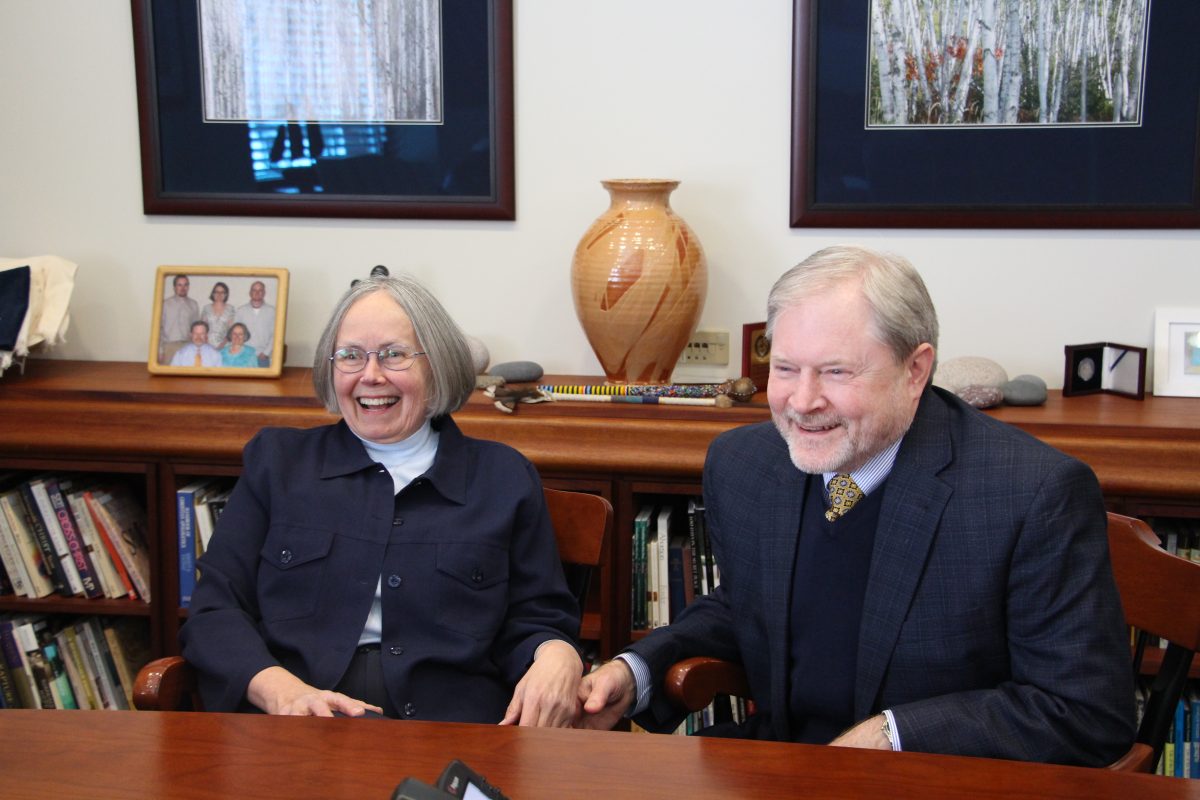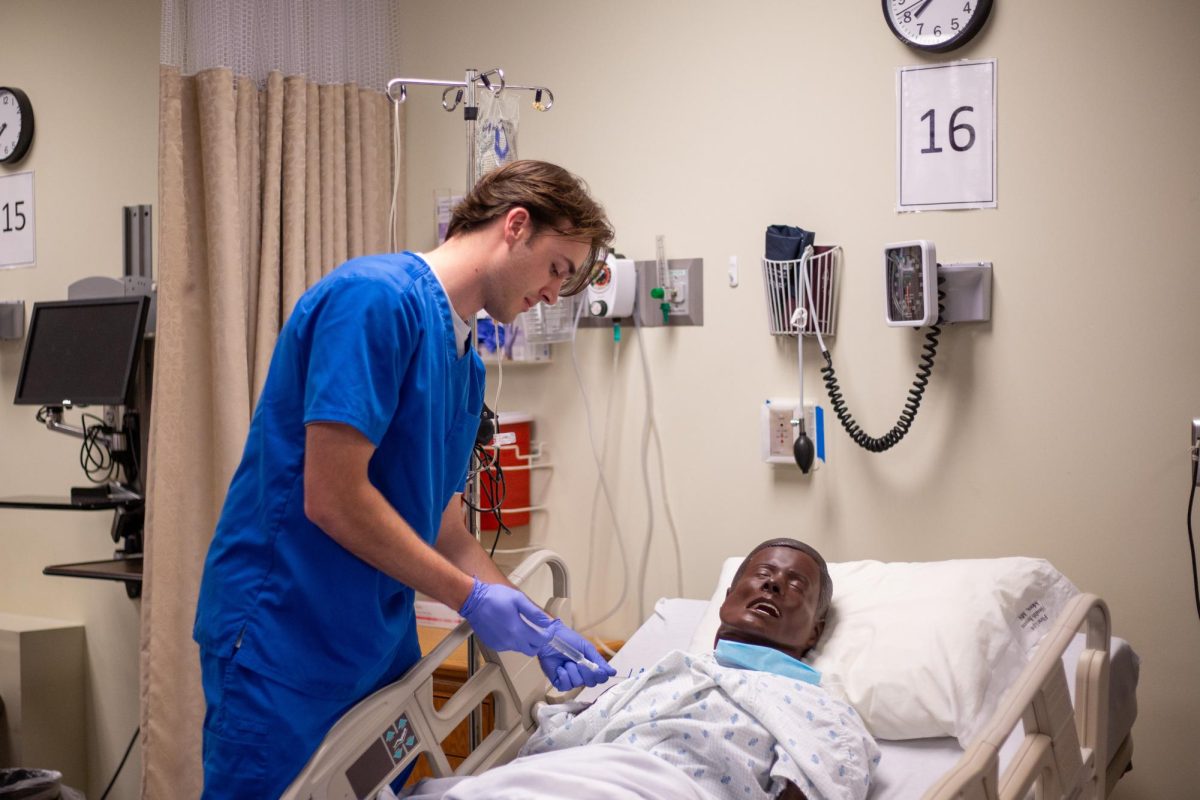President Jay Barnes and his wife, Barb Barnes, share some of their experiences and the vision Bethel has when it comes to harboring a community of faith.
By Jared Martinson
Q: Can you each tell me a little about how you were raised and how faith played a role in your growth?
Barb Barnes: I grew up in the Evangelical Covenant church, so anytime the doors were open, I was there. Covenant churches do Confirmation, and in eighth grade I was assigned to speak about the topic “Why am I a Christian?” I hadn’t made a profession of faith yet, not a meaningful one. I was a dutiful kid – responsibility is my number one strength – but I gave my speech that Sunday and then kind of lived a lie for a while, until I was in nursing school and my parents’ faith became my faith. It was tough being backed into a corner like that, which is why we were really cautious with our kids not to do that.
Jay Barnes: My experience was different from Barb’s. My family moved a lot during my growing-up years, so we were part of whatever denomination that our church was attached to at the time. When I was seven, I walked the aisle and made a profession of faith. What I knew as an almost-eight-year-old was more about my parents’ faith than my own. My college years were difficult years. I had more questions than answers. It wasn’t until going away from home as a resident director at the University of Connecticut that I was far enough away from my family to wrestle with faith and own it at a different level. I have a greater sense of confidence, but also a greater sense of mystery than I did before. I’m more confident of a God who loves me and calls me to be loving to others.
Q: Is there one person you leaned on for stability in your faith journey?
JB: My brothers and I went to Deerfoot Lodge, a Christian wilderness camp for boys in upstate New York. Seeing faith lived out by other men in a way that was robust and joyful and made people say, “I want to be a part of that” was part of that journey. Two men there were big pieces of my faith journey. When I was a residence director at Wheaton College, Sam Shellhammer was the Dean of Men. Sam prayed for me consistently for 40 years and still does to this day.
BB: For me, it was an intern at Trinity Seminary I went to church with in my nursing school days. He was just willing to sit down and answer all the questions that I had. Back in high school, I organized a group of my peers to go to a Billy Graham crusade. We came back very late at night and the only payphone was inside our school. I talked with our principal, Mr. Walker, and he said, “Because I trust you, you’re the only one I’d give the keys to the school, because I know you have integrity.” It wasn’t so much they influenced my faith journey, but they indicated that my faith journey mattered.
Q: When did you two know that you were supposed to be together as a couple?
JB: We met in 1970, at Deerfoot Lodge where we both worked for the summer. She saw me off at JFK airport when I left to go teach and do my required military service. She said “I love you” and I said “I don’t know” because I didn’t want to say something I wasn’t sure of. We wrote back and forth, and it took me about a month to come to my senses.
BB: The fourth week of camp that summer, I remember being out in the garden with my mother and I told her, “This is who I’m going to marry.” I had knit a ski sweater for myself and decided I would make a matching one for the person I was going to marry. So while he was in Germany, before I knew what he was thinking, I started knitting his sweater. His sister-in-law knew the story behind it, and when Jay opened it at Christmas, she and I were the only ones who knew what it meant.
JB: I came back from Germany at Christmas, we got engaged in January and married in June of 1971.
Q: What does your relationship with the Lord look like in a marriage and how do your faith lives interact on a daily basis?
BB: In our devotional lives, we tend to do it individually and then connect on what we’ve learned. It’s just what works with our schedule. I think where we’ve really grown is in a small group context. We still have friends from back in Pennsylvania that we connect with.
JB: It’s not a storybook description, but I think each couple has to figure out what works for them. It’s not going to be perfect. We’ve had to figure out how to grow individually and then bring it together and connect that way. We’re faithful to going to church, even on the days we don’t feel like it. But we’re not going to write the book “Your Perfect Spiritual Journey as a Couple.”
Q: What do you want Bethel to strive to deliver in terms of a faith experience?
JB: More than anything else, I want students to leave Bethel with a robust, mature, joyful Christian faith. A faith that works when life gets hard, when you have stress in your marriage, when your kid’s life blows up, when someone you love gets cancer. I want it to work by challenging the biggest problems for God’s glory and our neighbor’s good. I don’t want Bethel’s faith to be isolated and setting up walls. I want it to be a place that says “The love of Christ is present here.” Wherever you are in your journey, we want you to be engaged with us as a way to figure out who Jesus is. That’s what I give my life to. That’s bottom line for us.
Q: What’s your advice for students who are questioning, doubting or struggling to grasp their faith?
JB: Bethel’s a good place to do that, and it’s what we expect, actually. The advice I have is to accept it as okay. To engage with people who want to help answer those questions. We want to be unafraid of the fact that it’s normal, be the type of place that is with you on this journey, and we really care about the outcome. We’re going to ask you hard questions. Learning happens in a continuum. We live either in our comfort zone, our stretch zone or our panic zone. There is a limit on both ends to your stretch zone, and we understand it. Hard questions come sooner or later – what better place is there to get them than Bethel? We are trying to be serious about the right educational model.
This interview has been edited and condensed.

![Nelson Hall Resident Director Kendall Engelke Davis looks over to see what Resident Assistant Chloe Smith paints. For her weekly 8 p.m. staff development meeting in Nelson Shack April 16, Engelke Davis held a watercolor event to relieve stress. “It’s a unique opportunity to get to really invest and be in [RAs’] lives,” Engelke Davis said, “which I consider such a privilege.”](https://thebuclarion.com/wp-content/uploads/2024/05/041624_KendallEngelkeDavis_Holland_05-1200x800.jpg)
















